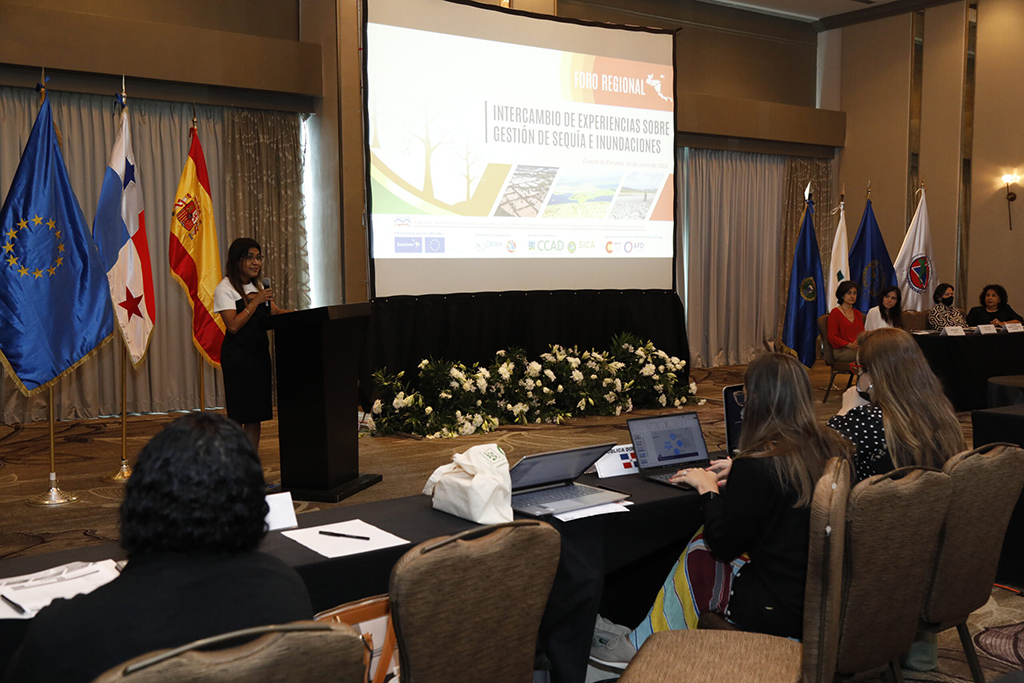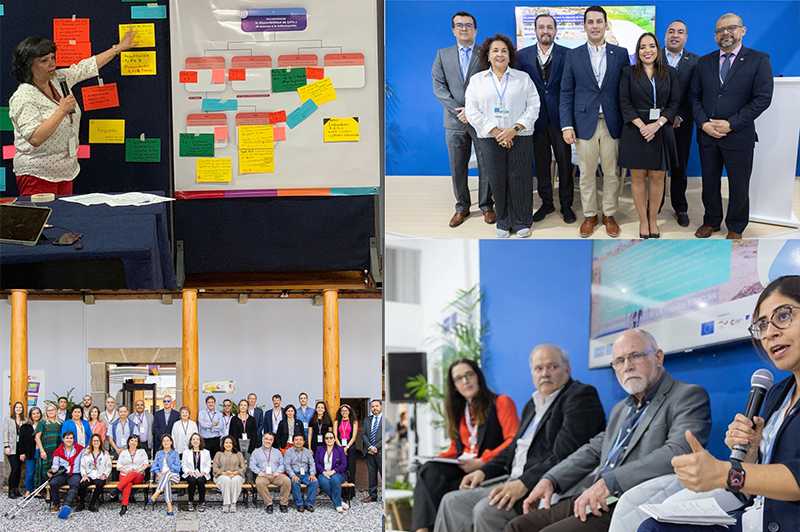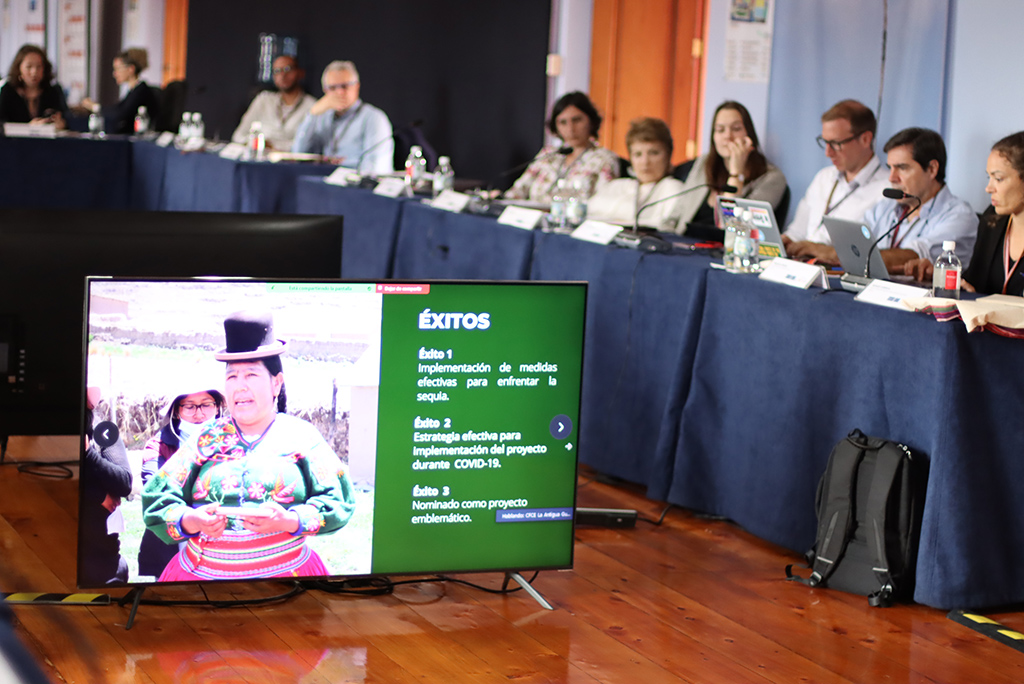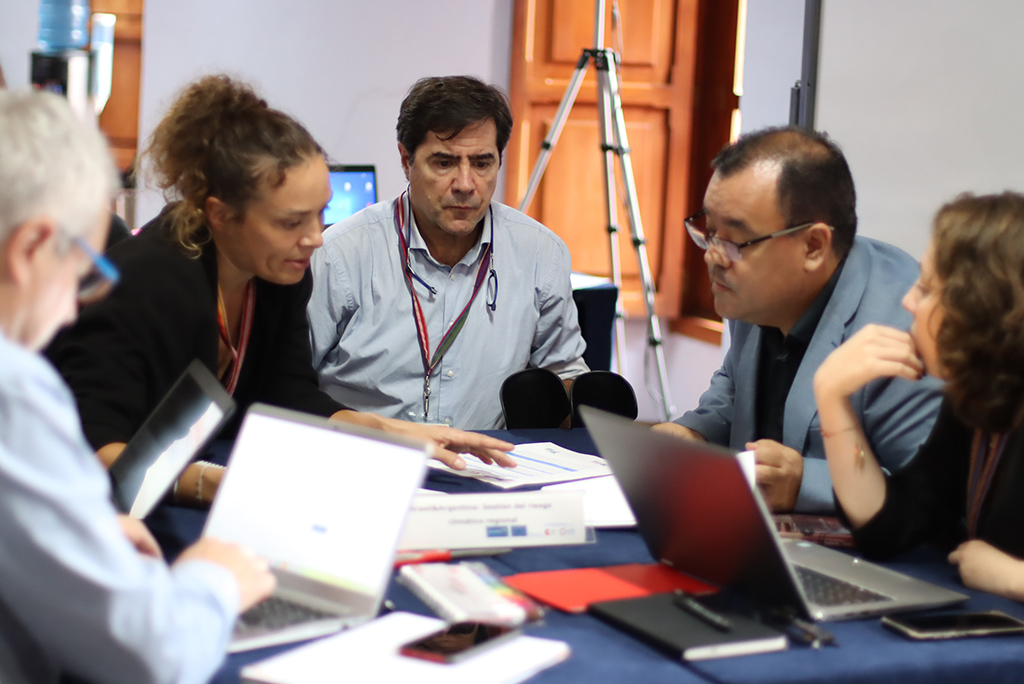During 2022, three projects successfully completed their implementation phase benefiting vulnerable populations in Peru, Bolivia, Colombia, Ecuador and Venezuela.
Increased capacities, development of public policies, new prevention models and more participation of their populations in risk monitoring, follow-up and prevention are part of the benefits brought by various EUROCLIMA+ Disaster Risk Management projects to 18 Latin American countries during 2022.
Seven of its sectoral projects made significant progress this year, based on the Sendai Framework for Disaster Risk Reduction 2015-2030. The commitments adopted by the countries in their fight against climate change and the identification of major challenges for the entire region stand out.
Three of these projects have completed their implementation process: the Pachayatiña/Pachayachay project "Information, governance and action for drought risk reduction in Peru and Bolivia in a context of climate change", the Binational Borderless Risk Management project "Strengthening national and regional drought and flood risk monitoring and management systems in a context of climate change and desertification in the Andean countries", and the project Ecuador and Peru: Vulnerability of the Population "Binational project for the reduction of the vulnerability of the population and their livelihoods to drought and flood hazards in border territories of Ecuador and Peru".
The Disaster Risk Management sector of the EUROCLIMA Programme is funded by the European Union and implemented and supervised by the Spanish Agency for International Development Cooperation (AECID) and the French Development Agency (AFD).
Collaboration for the benefit of the people
Last July, the project, Capacity Building for Flood and Drought Disaster Risk Reduction and Resilience Building in Central America held the Regional Forum for the Exchange of Experiences on Drought and Flood Management.
The event - held in Panama City - was attended by members of the Technical Committees on Climate Change and Integrated Water Resources Management of the Central American Commission for Environment and Development (CCAD), the national focal points of the Ministries of Environment of the Central American Integration System (SICA) and the national liaisons and focal points of the Coordination Centre for the Prevention of Natural Disasters in Central America (CEPREDENAC).
Also present were the directors of the National Meteorological and Hydrological Services, the national focal points of the Regional Water Resources Committee (CRRH) and representatives of the European Union and the Spain-SICA Fund.
Through the exchange of experiences and the presentation of project outputs and results, the forum contributed to climate adaptation and resilience in Central America, a region vulnerable to climate change.
Between 1970 and 2020, more than 70 per cent of disasters in this region were caused by hydrometeorological events; of these, 55 per cent were floods, 33 per cent were storms and hurricanes, 10 per cent were droughts, and 2 per cent were extreme temperature events.

On the occasion of World Climate Change Day, the Disaster Risk Management sector was part of the "Learning for Acting " initiative, a strategic alliance involving other institutions such as LatinClima, AECID's Cultural Centres, EUROCLIMA+, the Tropical Science Centre and the organisation Health Care Without Harm.
"Learning for Acting" made environmentally conscious actions, projects and activities visible throughout Latin America between September and October, including a photo contest in which more than 2,600 voters participated.
In October, the sector organised the "Sectoral Meeting on Disaster Risk Management" in Antigua, Guatemala, a space that facilitated the identification of the contributions and compliance with the Sendai Framework and where the importance of the latter for the reduction of the loss of human and economic lives as a direct result of disasters was addressed.
This meeting brought together technicians, experts and communicators in order to socialise success stories, expand knowledge, raise future challenges and learn about best practices that will allow them to continue working on the prevention and mitigation of the effects of droughts with a regional approach.
As a result of this meeting, the systematisation of all the lessons learned was set in motion in order to strengthen knowledge management and generate contributions to other actors and projects that will be worked on in the future in relation to this sector.
Scenario of experiences, dialogues and empowerment
COP27 took place in November and the thematic day dedicated to this topic in the EUROCLIMA pavilion served as a stage for discussing disaster reduction with a focus on loss and damage assessment, as well as the importance of public policy decision-making based on scientific evidence. All this with a cross-cutting focus on the protection of human rights.
During a full day, experts from Ibero-America and political authorities from Latin America analysed various topics, including the accounting and study of climatic events and the positive impact of international cooperation of the countries of the region in the prevention of risks caused by disasters.
The creation of a loss and damage fund was also agreed during COP27, one of the core issues of the thematic day.
Delegates at COP27 signed the draft agreement after intense days of negotiation, which was driven by Latin America and the Caribbean. This agreement will provide funds for the most vulnerable developing countries. Details on how the mechanism will work and where the funds will come from will be finalised in the coming months. The issue will be addressed at the COP28 meeting, scheduled to take place in the United Arab Emirates in 2023.
The closing of the year presents a space for analysing the challenges that 2023 will bring, including the need to establish a dialogue between actors for multilevel and intersectoral coordination, including the public and private sectors, and civil society organisations.
About EUROCLIMA+
EUROCLIMA+ is a programme funded by the European Union and co-financed by the German federal government through the Federal Ministry for Economic Cooperation and Development (BMZ), as well as by the governments of France and Spain through the Ministry of Foreign Affairs, European Union and Cooperation.
The Programme's mission is to reduce the impact of climate change and its effects in 33 countries in Latin America and the Caribbean, promoting mitigation, adaptation, resilience and climate investment. It is implemented according to the "Spirit of Team Europe" under the synergistic work of seven agencies: the Spanish Agency for International Development Cooperation (AECID), the French Development Agency (AFD); the Economic Commission for Latin America and the Caribbean (ECLAC); Expertise France (EF); the International and Ibero-American Foundation for Public Administration and Policy (FIIAPP); the German Society for International Cooperation (GIZ) GmbH, and the UN Environment Programme (UNEP).
About the sector Disaster risk reduction and management: droughts and floods
The component "Disaster risk management and reduction: droughts and floods" aims for the adoption of disaster risk management and reduction plans by national governments in Latin America to promote integrated flood and drought risk management in the context of climate change.
Projects under this component will contribute to preventing new disaster risks and reducing existing ones (specifically droughts and floods), with reference to the Sendai Framework for Disaster Risk Reduction 2015-2030. They will mainly address strengthening disaster risk governance and investing in disaster resilience.
For more information about each one visit: https://www.euroclima.org/en/risk-management


